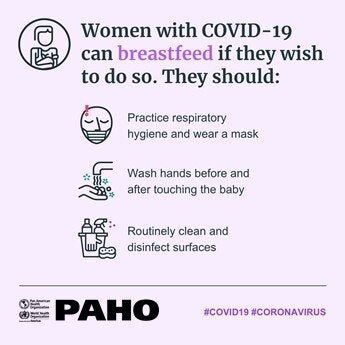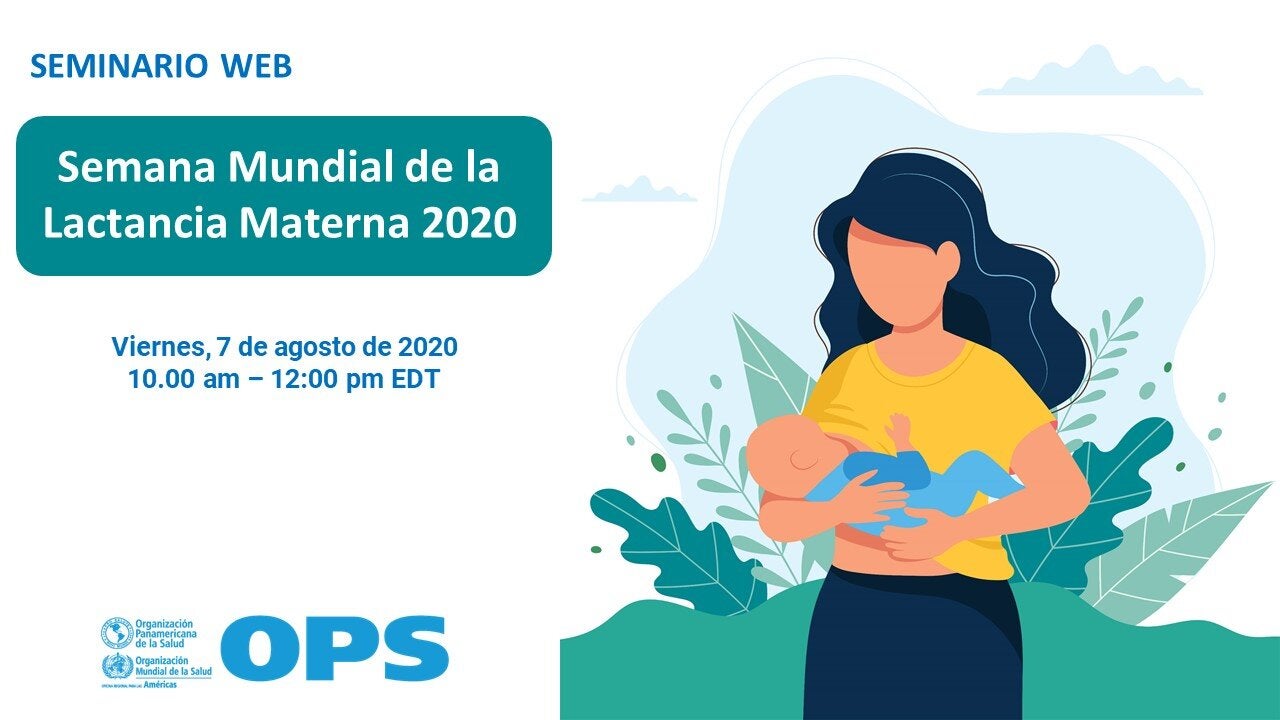Support breastfeeding for a healthier planet!
“Support breastfeeding for a healthier planet!” has been selected by the World Alliance for Breastfeeding (WABA), as this year’s theme for World Breastfeeding Week 2020. The theme focuses on the impact of infant feeding on the environment/climate change and the imperative to protect, promote and support breastfeeding for the health of the planet and its people.
Investing in breastfeeding can save infant lives and improve the health, social and economic development of individuals and nations. Therefore, and an enabling environment for breastfeeding, as well as the other facets of infant and young child feeding, must be created. The protection, promotion and support of breastfeeding require coordinated actions during normal times and perhaps even more so during emergencies. The COVID-19 pandemic has brought to the fore the need to advocate for breastfeeding as a public health intervention that saves lives and prevents infections and illnesses in the wider population.
World Breastfeeding Week, celebrated every year from 1 to 7 of August, is a global campaign coordinated by the World Alliance for Breastfeeding Action (WABA) to raise awareness and galvanise action on themes related to breastfeeding. PAHO joins the global community to support the efforts to strengthen measures to protect, promote, and support the right to breastfeeding across the Region of the Americas.
Breastfeeding improves health of babies and their mothers
- Breastfeeding is the optimal way of feeding babies, offering them the nutrients they need in the right balance, as well as offering protection against morbidity and mortality due to infectious diseases.
- Breastfed children have a lower risk of dental malocclusion and research has shown that there is a relationship between breastfeeding and scores on intelligence tests.
- Breastfeeding also helps to improve maternal health, as it reduces the risk of breast cancer, ovarian cancer, hypertension and cardiovascular disease.
Breastfeeding contributes to a healthier, better educated, more equitable, and more environmentally sustainable world
Breasfeading during the COVID-19 pandemic
PAHO/WHO continues to recommend that standard infant feeding guidelines be adhered to during the COVID-19 pandemic. The standard infant feeding guidelines are:
- initiation of breastfeeding within one hour of birth,
- exclusive breastfeeding until babies are six months old, and
- continued breastfeeding along with nutritionally adequate and safe complementary foods, until age two years old or beyond.
The benefits of breastfeeding and nurturing mother-infant interaction to prevent infection and promote health and development are especially important when health and other community services are themselves disrupted or limited.
Mothers and infants should be supported to remain together and practice skin-to-skin contact and/or kangaroo care whether or not they or their infants have suspected, probable, or confirmed COVID-19 virus infection. Breastfeeding counseling, basic psychosocial support, and practical feeding support should be provided to all pregnant women and mothers with infants and young children.
Resources
Q&A: Breastfeeding and COVID-19
Transmission of active COVID-19 (virus that can cause infection) through breast milk and breastfeeding has not been detected to date. There is no reason to avoid or stop breastfeeding.
Yes. In all socio-economic settings, breastfeeding improves survival and provides lifelong health and development advantages to newborns and infants. Breastfeeding also improves the health of mothers.
Yes. Immediate and continued skin-to-skin care, including kangaroo mother care, improves the temperature control of newborns and is associated with improved survival among newborn babies. Placing the newborn close to the mother also enables early initiation of breastfeeding which also reduces mortality.
The numerous benefits of skin-to-skin contact and breastfeeding substantially outweigh the potential risks of transmission and illness associated with COVID-19.
Yes. Women with confirmed or suspected COVID-19 can breastfeed if they wish to do so. They should:
- Wash hands frequently with soap and water or use alcohol-based hand rub and especially before touching the baby;
- Wear a medical mask during any contact with the baby, including while feeding;
- Sneeze or cough into a tissue. Then dispose of it immediately and wash hands again;
- Routinely clean and disinfect surfaces that mothers have touched.
It is important to replace medical masks as soon as they become damp and dispose of them immediately. Masks should not be reused or touched in the front.
Yes. Breastfeeding unquestionably reduces mortality in newborns and infants and provides numerous lifelong health and brain development advantages to the child.
Mothers with symptoms of COVID-19 are advised to wear a medical mask, but even if this is not possible, breastfeeding should be continued. Mothers should follow other infection prevention measures, such as washing hands, cleaning surfaces, sneezing or coughing into a tissue.
Non-medical masks (e.g. home-made or cloth masks) have not been evaluated. At this time, it is not possible to make a recommendation for or against their use.
If you are too unwell to breastfeed your baby due to COVID-19 or other complications, you should be supported to safely provide your baby with breast milk in a way possible, available, and acceptable to you. This could include:
- Expressing milk;
- Donor human milk.
If expressing breast milk or donor human milk are not feasible then consider wet nursing (another woman breastfeeds the child) or infant formula milk with measures to ensure that it is feasible, correctly prepared, safe and sustainable.
You can start to breastfeed when you feel well enough to do so. There is no fixed time interval to wait after confirmed or suspected COVID-19. There is no evidence that breastfeeding changes the clinical course of COVID-19 in a mother. Health workers or breastfeeding counsellors should support you to relactate.
No. There are always risks associated with giving infant formula milk to newborns and infants in all settings. The risks associated with giving infant formula milk are increased whenever home and community conditions are compromised, such as reduced access to health services if a baby becomes unwell, reduced access to clean water and/or access to supplies of infant formula milk are difficult or not guaranteed, affordable and sustainable.
The numerous benefits of breastfeeding substantially outweigh the potential risks of transmission and illness associated with the COVID-19 virus.
Facebook Live on Breastfeeding and COVID-19
Video: Breastfeeding and Covid19















